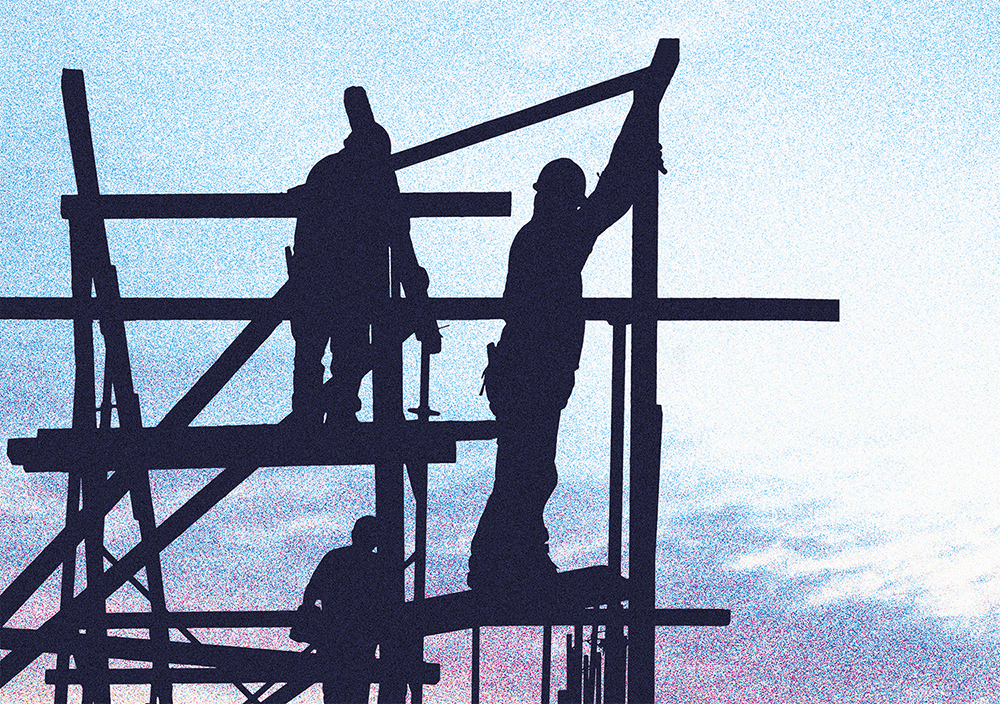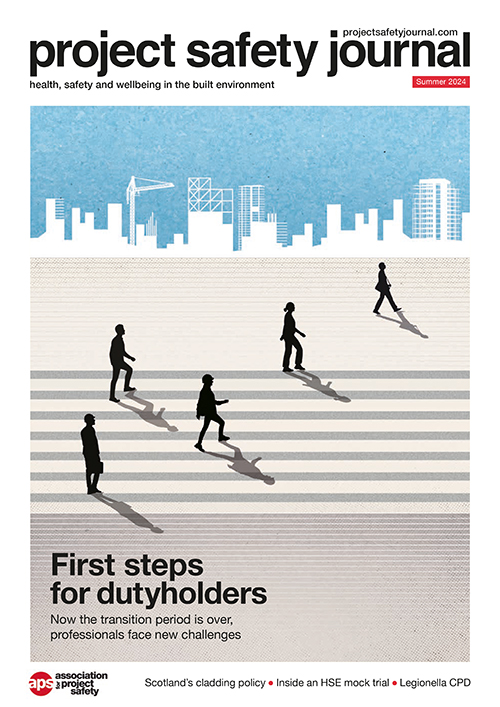
This CPD, in association with Achilles, examines how construction companies can ensure the ethical treatment of direct employees and people in their supply chains.
Construction companies employ more than 2.2 million people nationwide. But while many firms are striving to meet sustainability and carbon reduction targets, the sector faces challenges in ethically managing labour.

The United Nations’ International Labour Organization estimates that there are 50 million people held in situations of modern slavery. About 27.6 million people are in forced labour, including 3.3 million children.
Modern slavery continues to impact many people globally and highlights the need for businesses to ensure the ethical treatment of people in their direct employment and those working within their supply chains.
Poor ethical employment practices vary in severity from the most critical forms of modern slavery, such as human trafficking, to poor working conditions and practices affecting potentially huge numbers of workers.
For instance, Achilles’ Ethical Business Trends Report, published in February 2022, identified that 17% of construction workers interviewed had received wage deductions for administration or payroll purposes.
According to anti-slavery charity Unseen UK, construction and related industries have been identified as key sectors associated with modern slavery globally.
Worker exploitation: policy versus practice
While the UK has legislation in place to tackle modern slavery, there continues to be a high prevalence of poor ethical employment practices.
As a result, there are further opportunities to raise industry standards. Despite many companies holding modern slavery policies, these are not being seen in practice.
Audits by Achilles identify poor practices which may provide a gateway to more serious forms of labour abuse.
There are often noticeable and common gaps – both with national framework contractors and much further down the supply chain – when it comes to understanding the complex ethical employment risks associated with the construction industry.
What are the most common trends?
Often there is an assumption that companies within the supply chain have adopted appropriate ethical recruitment and employment practices.
Construction managers should engage with their supply chains and verify the processes that they have in place, in addition to considering those that are directly employed by themselves.
All classifications of workers should be considered in the same way as a direct employee. Achilles’ Ethical Business Trends Report identified that 11% of audited companies were unable to demonstrate that written terms and conditions of employment had been issued to workers.
Communication channels should be created, from initial engagement to the termination of services, to ensure individuals are aware of their basic employment rights and the terms associated with the assignment.
Policies and procedures
Established reporting and escalation routes for worker concerns should be available to all workers and clearly displayed. Policies and procedures should be considered as a commitment or an intention as opposed to evidence of compliance.
Construction managers should also consider verifying that intentions outlined within policies are enacted.
Recognised standards such as ISO 9001:2015 refer to the ‘Plan, Do, Check, Act’ cycle for monitoring and continual improvement. There is no reason a similar approach should not be considered when seeking to ensure the ethical employment of workers and their treatment on site.
Ensuring the ethical treatment of workers plays an important part in tackling modern slavery. Some issues may be considered less serious than those seen in the headlines, but can leave workers susceptible to labour abuse. The identification of improper practice may be the tip of an iceberg that has largely gone unnoticed previously.
Rather than assuming the issue has gone away or only happens in other industries or other countries, it needs to be acknowledged that this is a global issue affecting people on a daily basis within supply chains.
For example, nine UK construction workers had reportedly witnessed acts of racial abuse and discrimination on sites where Achilles had conducted Ethical Site Surveys.
Spotting the warning signs of worker exploitation
Five years’ worth of Achilles’ data, site visits and worker interviews has demonstrated that there are still fundamental issues not being addressed, and significant opportunities for improvement regardless of industry or location.
Currently Achilles’ 2022 Ethical Site Survey data shows that 31% of interviewed workers have presented non-standard evidence of right to work in the United Kingdom, such as CSCS cards or driving licences.
Changes in supply chain due diligence legislation will soon place an emphasis on all businesses to do more to identify poor practices and prevent labour abuses within the supply chain.
Remediation rather than disciplinary reaction
Construction managers should educate and share knowledge to encourage transparency in supply chains in order to identify and plug the gaps that might exist.
While it would be easy to ignore this problem, there is a moral obligation to work towards improving practices within supply chains.
Managers should also consider the full range of tools at their disposal to promote best practice and ensure all workers are treated fairly. Ensuring workers are fully aware of their rights helps create an empowered workforce and is key in mitigating exploitation risks.
A comprehensive induction process, including awareness of employment law and company policies, is vital to ensuring workers know what to expect and, crucially, are aware when something isn’t right.
It is not enough to assume workers know their rights and entitlements. A lack of knowledge leaves a worker open to exploitation.
Evidence of supplier compliance is an essential part of any modern slavery strategy. During supplier onboarding, consider how your suppliers will be required to substantiate their compliance to relevant codes of conduct. This should not simply be a tick-box exercise.
The use of spot checks both on site and at contractor premises, or full Management System Audits, provide further opportunity to interrogate supply chain processes.
Helping Sir Robert McAlpine and British Land to tackle modern slavery
A pilot of Achilles’ Ethical Business Programme helped partners to identify potential issues.

British Land and Sir Robert McAlpine have been using an Achilles service to find out more about what’s really happening in their supply chain from the tradespeople contracted to work on their sites. When Achilles launched its Labour Practice Audits in 2015 (currently Ethical Business Programme), British Land and Sir Robert McAlpine were keen to pioneer their use.
Challenge
British Land was due to start work, in partnership with Sir Robert McAlpine as lead contractor, on the next phase of the 13ha Broadgate campus. At the same time, the Modern Slavery Act (2015) entered UK law, requiring companies to take responsibility for understanding the ethical performance of all businesses in their extended supply chains.
The two companies agreed to carry out a pilot project with Achilles to assess the effectiveness and value of the Labour Practice Audits.
Alice Hands, Sir Robert McAlpine’s head of ethical and sustainable procurement, comments: “In terms of seriousness, forced labour and modern slavery represent the extreme end of a very wide spectrum. There are multiple lesser issues, all of which we wanted to address to ensure people are treated correctly, to counter any negative attitudes to our industry and to help ensure that Sir Robert McAlpine is recognised as
a great place to work.”
Issues can include a lack of thorough due diligence, poor access to grievance procedures and failure to appropriately translate health and safety briefings.
The high proportion of self-employed workers can also give suppliers the opportunity to issue business-to-business contracts instead of contracts of employment, losing protective and other legislative measures.
Process
In determining the scope of the Labour Practice Audits, it was vital to both companies that onsite interviews were non-intrusive, unannounced in advance and anonymous (although identifying immediate employers). Only then would workers feel at ease to share how they really felt.
It was also important that interviewees were never taken away from their work, as this would mean they could be identified and lose anonymity.
Instead, the Achilles interviewers settled in site canteens and asked workers on a break for a few minutes of their time. In an overwhelming number of cases, workers were happy to help.
Following the interviews, the findings are analysed by both companies and Achilles to establish areas that need to be prioritised and subcontractors who need help most urgently.
The outcomes have been enormously helpful in enabling the partners to identify and start addressing potential issues. Inevitably, the Covid-19 pandemic disrupted delivery of the Labour Practice Audits programme, along with everything else.
To continue engaging with the supply chain, the programme moved to virtual Management System Audits with key supply chain partners and trades. These continue to grow awareness of potential supply chain issues, build good practice and raise standards for ethical employment.
Results
Hands says: “Some audits are simply about ticking boxes – as such, they are completely useless. The Achilles Labour Practice Audits (currently Ethical Business Programme) are proving to be the opposite.
We are constantly uncovering new findings and learning more and, as long as the audits are providing us with increased knowledge and enabling us to fix issues we find, we will continue to carry them out.”
British Land’s sustainability manager Karina Williams highlights the support for its wider goals: “Working collaboratively with Sir Robert McAlpine and Achilles, we are pleased to have pioneered this audit programme, promoting better working environments and helping spread best practice across the industry.”
CPD Module Content
Information in this CPD was correct at the date of publication.





